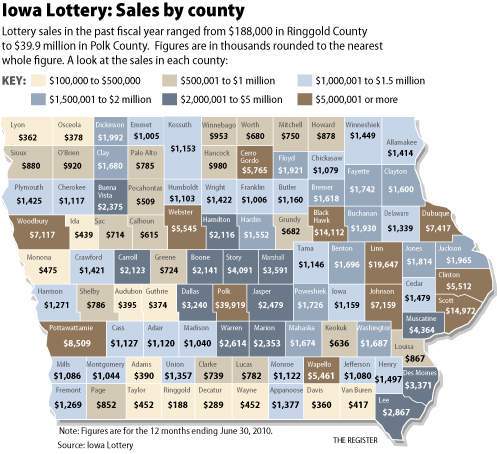The newspaper headlines in August 1985 were a sign of the unbridled enthusiasm over the arrival of the Iowa Lottery.
"Lottery mania grips Iowans."
"Iowa lottery tickets selling like hotcakes."
"Eager lottery players stampede for startling 1.6 million in tickets."
Twenty-five years and $4.8 billion in sales later, the Iowa Lottery remains popular statewide, generating $256 million in sales for the 12 months ending June 30. It's also a game that has changed with the times, moving from simple scratch-off tickets to chances on multistate jackpot games such as Powerball, which are sold on retail computer terminals.
"It's raised over $1 billion for good causes in this state. I guess that's the principal benefit of it, and a lot of people have had fun playing lottery games in order to raise that money," said Edward Stanek, the Iowa Lottery's first director from 1985 through 2007.
Looking ahead, Iowa Lottery players could have the option of playing lottery games on iPhones and other so-called smart phones. Such games already are available in Europe, said Terry Rich, the lottery's current chief executive officer.
"I think our job is to look at the future and try to figure out what electronic delivery system is correct," Rich said Thursday in an interview with The Des Moines Register. He noted his own children all use debit cards, don't pay cash for anything and use smartphones and the Internet to pay bills.
So it makes sense to adapt games for a younger generation of players who enjoy social networking, playing longer and accumulating points while using the latest technology, he said.
But don't plan on playing Iowa Lottery games immediately on a smart phone, Rich added. Federal legislative issues likely will need to be addressed, and he wants to see what happens in other states, including Illinois and New York, that have expressed interest in Internet games. Iowa's elected leaders will need to be consulted, he said.
"Whatever we do, we always have the mandate from the Legislature to make sure that people who are playing are over 21, aren't using a credit card and are within the state's borders," Rich said.
The birth of the Iowa Lottery a quarter-century ago didn't come easy. Gov. Terry Branstad, who is campaigning this year to return to the governor's office, twice vetoed the Iowa Legislature's approval of lottery bills. Some religious leaders also objected, saying a state-sponsored lottery would be immoral.
"A lottery would place state government in the position of preying on people's false hopes for instant wealth. This is not the kind of honest and straightforward approach Iowans expect from each other and from their state government," Branstad said after a 1984 veto of a lottery bill.
But Branstad, a Republican, changed his mind in 1985 amid falling popularity ratings, saying his personal opposition was well-known but he hoped the games would create jobs. He signed the lottery bill in a televised ceremony on the Iowa Capitol steps.
A Des Moines Register Iowa Poll in March 1985 had shown 74 percent of Iowa adults wanted a state lottery, while 18 percent were opposed. Branstad was on the campaign trail Thursday and not available for comment, an aide said.
Former Iowa House Speaker Don Avenson of Oelwein, now a legislative lobbyist, recalled Thursday that the push for approval of the Iowa Lottery gained traction after political leaders learned that $1 Illinois Lottery tickets were sold openly for $1.25 at plant gates in eastern Iowa.
"It made little sense for us to have that going on, and Iowa not benefiting from the proceeds," said Avenson, a Democrat.
State lawmakers decide how to spend Iowa Lottery profits, and most of the money now goes to general state government programs, such as education, public safety and environmental protection.
A whirlwind of activity surrounded the 1985 start-up of the Iowa Lottery with only 122 days between Branstad's April bill signing and the first sale of tickets in August at the Iowa State Fair.
Stanek recalled watching television one morning and seeing an enthusiastic crowd standing in the rain to buy lottery tickets. So he jumped in his car and headed to the fair, getting drenched with them — and ruining a new wool suit and pair of leather shoes.
Not everybody thinks the lottery has been a good deal for Iowa.
"It's an obvious regressive tax, and it falls disproportionately on the people in Iowa who can least afford it," said Tom Coates of Norwalk, a longtime critic of Iowa's gambling industry.
But one good thing about the Iowa Lottery is that it's not growing, said Coates, who describes the lottery as a "stable malignancy." He said he would oppose the introduction of smartphone lottery games, saying any effort to speed up gambling increases the addictive nature of the game.
Rich disputes Coates' criticism, saying the typical Iowa Lottery player makes about $50,000 annually and the demographics of lottery players slice evenly across income levels. Statistics from the Iowa Gamblers Treatment Program in 2009 showed about 7 percent of clients admitted to treatment identified the Iowa Lottery as their primary form of wagering. More than 77 percent cited casino gambling as their primary form of wagering.
"The nice thing about the Iowa Lottery is that it's optional, I think that is what has made it effective. People who don't want to play, don't — yet everybody benefits with the proceeds that come in from that," Rich said.





Congratulations Iowa on celebrating their anniverary.